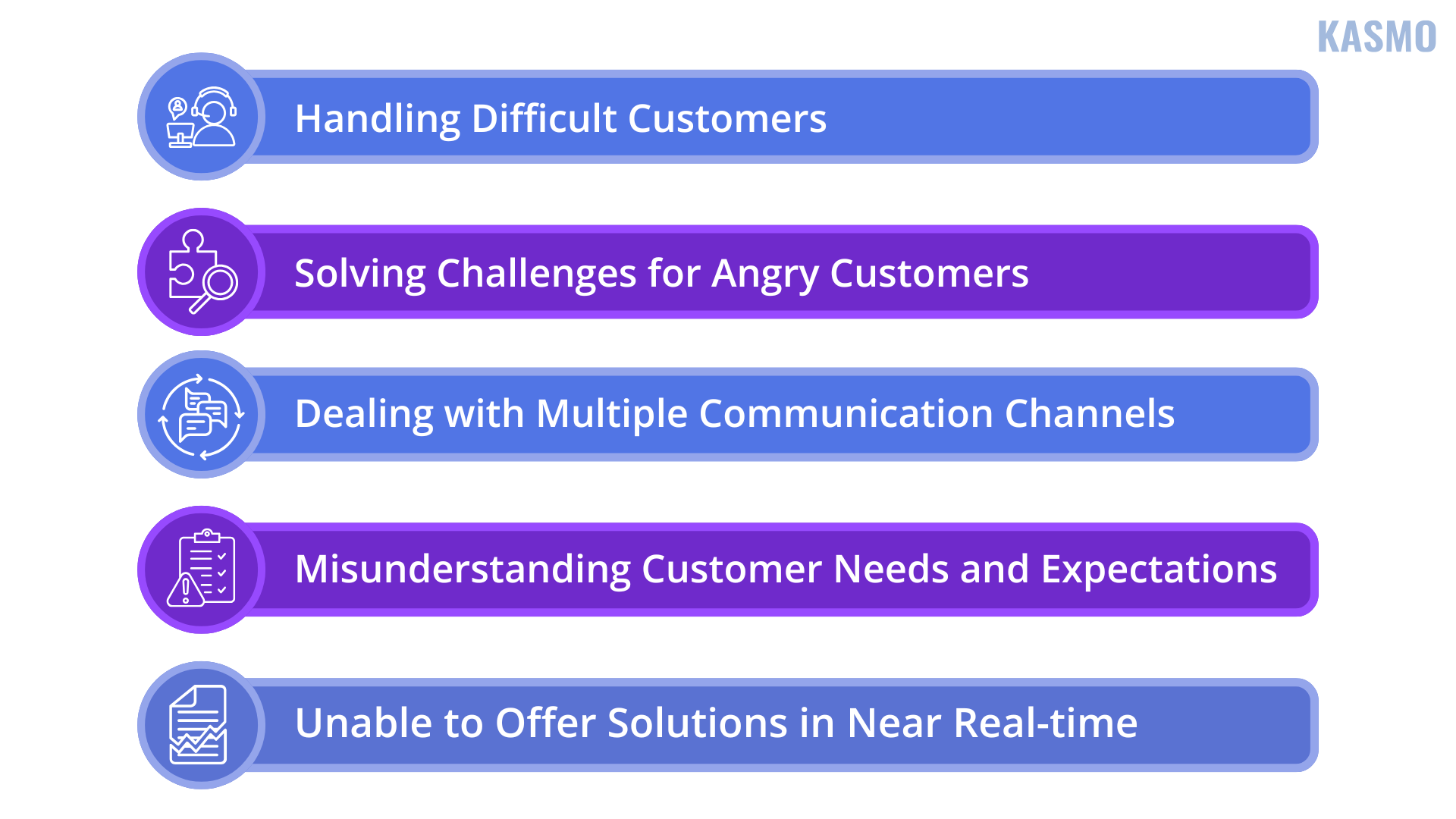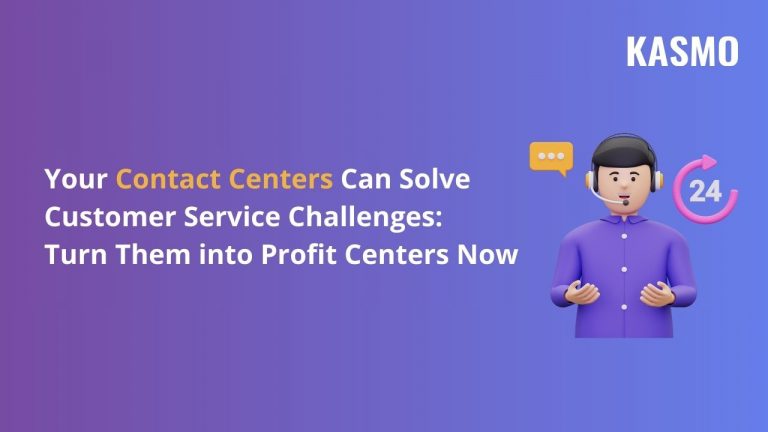There are many expensive and time-consuming ways consumer goods companies can improve their customer experience. But sometimes these costly and resource-intensive ways can be futile in drawing the customer’s attention towards the brand. Reason? Your customers cannot connect with your brand. So how to build up connections and navigate several critical customer service challenges?
Through your contact centers. Today, customers want more than good customer service. They want every interaction to be personalized and tailored to their needs. Every customer interaction across your business—from initial consideration to purchase, delivery, and beyond—is important.
Most customers begin their journeys to a consumer goods company through digital channels. Therefore, it is crucial that you deliver an exceptional customer experience (CX). With the help of your contact centers, you can create sustainable business growth, expand market share, and drive higher revenues in the future. Prioritizing CX will be key to meeting customer expectations effectively.
Contact Centers Are Not Cost Centers. They Solve Your Customer Service Challenges.
Providing good customer service is especially important for every consumer goods company. Providing exceptional customer service is not enough; you need to have a personal touch to your service that will make the customer feel important.
Customer service challenges in a consumer good business can come in many forms. Some of these are:

Consumer goods companies can reduce costs without compromising on customer service. Previously contact centers have been the first touchpoint for customers if they wanted to resolve any issue. The customer service personnel would get in touch with the customers facing challenges and provide solutions that might have taken three-five business days.
But customers don’t want to wait for long to get their solutions. They want it fast and preferably in near real-time. To cater to their needs, consumer good companies have come up with customer self-service portals that play an important role in solving their problems. However, consumers may still prefer to converse with customer service personnel.
So, what strategies can help consumer goods companies improve customer experience through their contact centers?
Ways Consumer Goods Companies Can Enhance Their Contact Centers
Contact centers help consumer goods companies improve customer experience by offering their customers creative choices that may not come from AI-powered tools. These contact centers unlock new opportunities for the sales and marketing teams of the business to create strategies that will generate new revenue streams and provide richer customer experience.
Here are 5 ways to improve customer experience through your contact centers:
Democratize Your Data
To provide exceptional customer service and navigate several contact center challenges, consumer goods companies need to democratize their data. Your customer service professionals need to have full and uninterrupted access to customer data. But care should be taken not to break any privacy policies or regulations while you are democratizing your customer data.
Consumer goods companies can put all their customer data in a CRM (customer relationship management) platform. This allows the customer service personnel to have a 360-degree view of customer interactions with the brand. By analyzing customer interactions, they can get instant access to insights, which helps to be more intuitive and proactive.
This data-driven approach enables customer service agents to make better-informed decision-making, that enhances customer satisfaction and drives revenue growth. Additionally, training them to use AI-powered platforms which are pre-fed with customer’s history with the brand, facilitates them to have deeper and more insightful conversations with the customers.
Armed with the knowledge of customer data, these agents increase the chances of customers making additional purchases and strengthen the opportunities for the consumer goods brand to get repeat customers. As the brand now addresses their consumers’ needs, it increases brand loyalty. By prioritizing personalized interactions, consumer goods businesses can foster loyalty and enhance overall customer experiences.
Leverage the Power of AI to Solve Customer Service Challenges
To solve customer service challenges, consumer goods businesses need to harness the power of AI. Training and educating customer service personnel in AI tools and AI-powered platforms helps the brand to stay on top of their customer service game.
Integrating AI into contact center workflows increases both efficiency and productivity of the agents. With the help of AI, consumer goods companies can automate challenges according to the level of difficulty. Agents need not switch between multiple systems to answer customer queries.
Consumer goods businesses can seamlessly integrate AI into their dashboards, empowering agents to receive data-driven guidance through natural language. This helps agents cater to consumer needs.
For instance, consumer B has been struggling with a product for quite some time. They had taken help from the self-service portals, AI-chatbot assistance and even in the community forums. However, they are still unable to solve their problems. Arming the customer service personnels with this knowledge simultaneously with AI helps the agents to reach out to consumer B before they abandon the product and decide to not engage with your brand.
Consumer goods companies can ensure their CRM system is integrated with contact center software. This provides agents with instant access to customer data, reducing call-handling times and enhancing service quality.
With AI you can also automate routine tasks that lessens the manual workload for agents. Automation can summarize case resolutions for agents, helping them to manage frequent follow-ups and concentrate on higher-value interactions.
Utilize “Humanized” Upselling and Cross-Selling
You might wonder what “humanized” upselling and cross selling means. If you would have noticed when you shop online, you are recommended multiple products that go with the product you might be purchasing. Sometimes you might be also suggested products that is an upgraded version of the product that you might choose. This suggestive upselling and cross-selling methods can sometimes dissatisfy customers.
To improve contact center customer service, consumer goods businesses need to elevate their customer service agents to customer advisors. This enhancement changes the way customers view the contact centers – not as a space to only get their questions answered but also enhance their purchasing experience.
By providing your customer service agents with all the consumer data you can help these agents satisfy customer needs and address potential issues proactively. A robust CRM system integrated with AI plays a crucial role in transforming your customer service agents to customer advisors.
AI analyzes historical data patterns to predict future customer behavior. For instance, if the consumer data indicates that a specific product sells quickly during certain periods, AI can alert the customer service team to reach out to customers, preventing out-of-stock situations. This also helps the agents to perform upselling and cross-selling, increasing revenue.
If consumer goods companies are leveraging AI, then it can empower their customer service agents to enhance their upselling and cross-selling initiatives by understanding individual customer preferences and past interactions. They can tailor communications for those customers who may hesitate to make the purchase of any product.
For example, if a customer frequently orders a specific product, but they are not making their regular purchase, then AI can alert the customer service agent to reach out to them and understand their challenges. If the customer is no longer interested in that product, the customer service agent can use this opportunity to upsell or cross-sell a product.
Take More Proactive Strategies to Solve Customer Service Challenges
Consumer goods companies can also monitor real-time performance and identify any issues that may create a problem while the agents are conversing with the consumers. This allows the companies to take prompt action to mitigate problems or prepare for service interventions. With the help of AI, consumer goods companies can also predict the demands of customers. This eradicates any last-minute shortage or over-production of goods.
Add Value to Your Services Through Contact Centers
Consumer goods companies generally provide warranties for their products. But what will make you stand apart from other competitors? Loyalty Programs. To make your loyalty programs distinguished from your competitor’s ones, leverage AI.
AI can optimize loyalty programs by automatically informing existing members to activate and redeem rewards, many of which they may not realize they’ve earned. Additionally, AI platforms can also help customer service agents inform customers while they are engaging with them. This increases the actual value of the loyalty programs as it will give a “human touch” to the loyalty programs. This approach makes the programs more appealing and fosters strong customer-brand relationships.
Conclusion
Consumer goods companies can solve major customer service challenges by turning their contact centers into profit centers. This helps the company to stand out in a competitive market. By leveraging data and AI, brands can empower their agents to become trusted advisors.
This ensures every customer interaction is personalized and tailored. This strategic approach enhances customer satisfaction and drives revenue through effective upselling and cross-selling initiatives. By prioritizing customer-centric strategies and utilizing technology to educate your customer service agents, consumer goods companies can build stronger relationships with their customers, fostering loyalty and encouraging long-term engagement.


